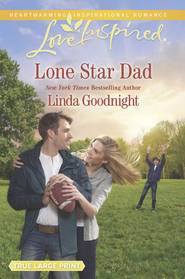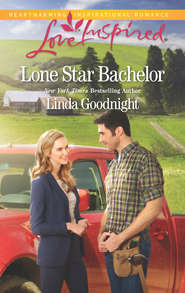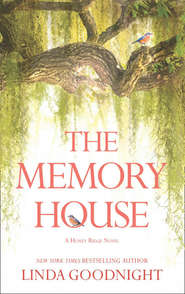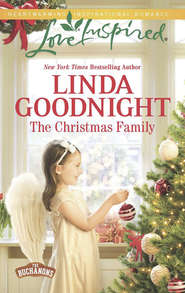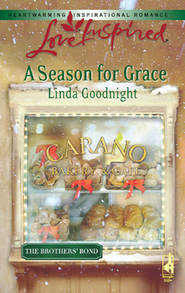По всем вопросам обращайтесь на: info@litportal.ru
(©) 2003-2025.
✖
Sugarplum Homecoming
Автор
Год написания книги
2019
Настройки чтения
Размер шрифта
Высота строк
Поля
Lana blanched, eyes widening as she swiveled her head toward the peeling paint and loose siding and then back to him. “The house has been vandalized?”
Hadn’t the woman considered the possibility?
“I haven’t been inside in a couple of years, since before your mother passed, but things had run down even then.” He didn’t say the obvious. Patricia Ross had two daughters and neither had come home to help their ailing mother. He couldn’t imagine being that coldhearted against your own kin. But then, Lana and Tess Ross hadn’t been the usual girls. Patricia’s brother had come from Nevada to bury her.
“Vandals,” Lana murmured, looking as if the weight of the house was on her shoulders. “Wonder what that will cost to repair?”
Regardless of his doubts about her, Davis’s natural compassion kicked in. He could help her out. He had the expertise. He was her neighbor. He fought the urge, but kindness won out in the end. Might as well give in to it now and save wrestling with his conscience later.
“I could take a look around the place if you want and give you a rough estimate.” That was all he planned. Just a quick walk-through.
“You do that sort of thing?”
The warm autumn wind lifted a lock of her hair and swirled it around until she had a spiderweb of brown matted on top of her head. She brushed at the nest, making it worse. He found the look charming and vulnerable. Davis was a sucker for vulnerable.
Tough-as-nails Lana Ross, vulnerable?
“I can,” he said. “Mostly, I lay tile but I’ve flipped a house or two. I can do a little of everything when the situation calls for it.” His face relaxed in a self-mocking grin. “In tile work, especially around here, the situation almost always calls for it. If I redo a shower, the floor beneath is inevitably rotten. Tile a floor? Bad joists.”
For the first time since his arrival, Lana’s pretty mouth curved. Just a little. “A true renaissance man?”
“Nowhere near that interesting, but I do know my way around a construction site.”
Renaissance man. Huh. Funny. Except when he had a trowel or a hammer in hand, he was as boring as vanilla pudding. Didn’t his sister remind him of that fact at least once a month? Jenny was forever trying to get him out into the world again. The dating world.
“Thanks for the offer, Davis,” Lana was saying, “but I guess we need to get settled in first and then figure out where to go from there.”
“Got it. Good plan.” She was blowing him off, rejecting his offer. Even though disappointment made his smile droop, Davis knew he should be glad about her refusal. He’d have no obligation now, no guilty conscience for not being neighborly to a woman and her daughter living alone.
Which brought him to another subject: Where was Sydney’s father?
As soon as the question settled in like good grouting mud, another followed. She’d never addressed Nathan’s oddball question about being married, and she and Sydney were moving in without any sign of a man. Recalling Lana’s teenage years, Davis thought the chances were very good the two were alone.
Chapter Two
“He was nice,” Sydney said.
Lana absently stroked a hand over Sydney’s frizzy hair as they stood on the top porch step—the only porch step—and watched Davis Turner and his kids recross the quiet residential street. A vanilla breeze danced around their feet, tossing leaves and dirt over their shoes and into a growing pile against the siding.
Davis was nice, but she’d seen the shock in his eyes and felt the temperature drop when she’d told him her name. He remembered.
Nothing she hadn’t expected but still the reaction stung. She’d changed, thank God, the day she’d stumbled into a Nashville street mission drunk as a skunk after getting turned down for an important gig at the Opry. She hadn’t known it then, but both had been her last chance. She’d never sung in public again, but she’d found the Lord and started on a new path.
Lana looked at Sydney, her throat aching with love and guilt. “Maybe you can be friends with Paige and Nathan.”
Dear Lord, don’t make Sydney pay any more for Tess’s or my mistakes. Let this work. Make it work for her sake.
“Will Paige be in my class at school?”
“Probably. Maybe. I don’t know. We’ll have to ask. Come on, let’s get the car unloaded.” She thumped the flat of her palm against the center pillar in a show of energy she didn’t feel. They still hadn’t worked up the nerve to go inside the forlorn two-story, but they were here and they would stay. Regardless. Somehow she and Sydney would turn this dreary old relic into a real home, clearing out one room and one old ghost at a time.
“Nathan was nice, too,” Sydney said. She reached her skinny arms into the backseat of the old Ford and dragged out a cardboard box. “He said I could swing on his swing set sometime.”
“He did?” Lana had not even noticed the children talking, probably because she’d been too focused on their handsome father. Boy, did she ever remember him!
“Uh-huh. He did. So, can I?”
“We’ll see.”
“Paige said they have a dog. Can we get a dog?”
“I don’t think so.” When she saw Sydney’s expression, Lana hurried to say, “Maybe later after we’re well settled.”
Sydney shoved the box onto the grass with a grunt. “Am I staying at this school forever?”
“Poor baby.” Lana squatted for a hug. Sydney had changed schools frequently enough to develop reading difficulties. Lana was determined to remedy that problem this year. Stability was the answer, even if it meant living in this awful house. “We’re going to try.”
Sydney rested her hands on Lana’s shoulders, face close. She had the most beautiful olive skin and turquoise eyes.
“You’re not going to sing no more? Never?”
The loss was still as sharp as a hot stick in the eye. Music was the only thing Lana had ever been good at, though like everything else, not good enough. “No, baby. I have a real job now.”
“Oh, yeah. I forgot.” Sydney screwed up her face, feathery dark eyebrows drawing together over her nose. “What was it?”
“I’ll be working for the Whisper Falls newspaper.” She popped the lid on the trunk. Their pitiful possessions were stuffed into two cardboard boxes and a couple of battered suitcases. “I’ll have press passes which means we’ll get to go to lots of fun events for free. Football games, carnivals, plays, all kinds of things.”
“Cool.”
Actually, she was a stringer covering local events for the small paper. The pay was minimal but it was money. Along with the amount her mother left behind—unintentionally, Lana was certain—they should be all right for a while. That is if she could figure out how to write an acceptable article. School hadn’t exactly been her thing, but like singing she could always write. She’d written lots of songs, none of which had been picked up, of course.
Joshua Kendle, the newspaperman on the other end of the telephone, had promised on-the-job training and hired her sight unseen, so how hard could the reporter job be?
Desperate times meant desperate measures. She would personally hand deliver every paper in town—or live in this house—to give Sydney a normal, stable life.
Sydney, slender back bent in half, began pushing a cardboard box across the grass.
“Hold on and I’ll help you.” Lana slammed the trunk of the dependable old Focus with one hand while balancing yet another box on her hip. Though she mourned the loss of her pickup truck, the Focus had been more economical and more sensible.
“I can do it by myself.”
Box on one hip, Lana grabbed the smaller of the suitcases and rolled it, bumping along behind Sydney as she crossed the dry brown grassy distance from the cracked driveway to the porch. Times like these she could use a man around to help out.
Her thoughts shifted again to Davis Turner. She’d had a mild crush on him in high school though he’d never known it. He was an upperclassman, the boy everyone liked because, unlike his sister Jenny, he didn’t have a snarky bone in his body. She wondered if he was still that way.
Time hadn’t damaged his appeal. That was for certain. If anything, maturity had made him more attractive. Very Matt Damon-ish, and hadn’t she always had a crush on the fresh-faced actor?
Lana shook her head in disgust. Men had been her downfall one too many times. Now that she had Sydney to consider and she no longer drank, she wasn’t going down that road again.






